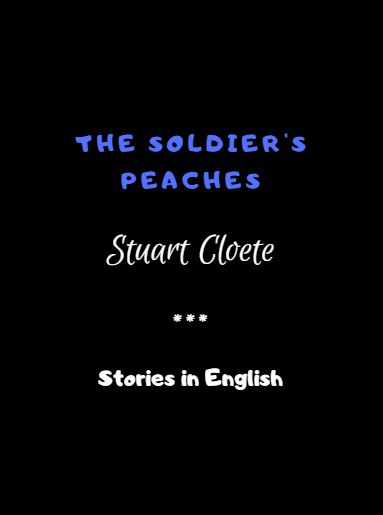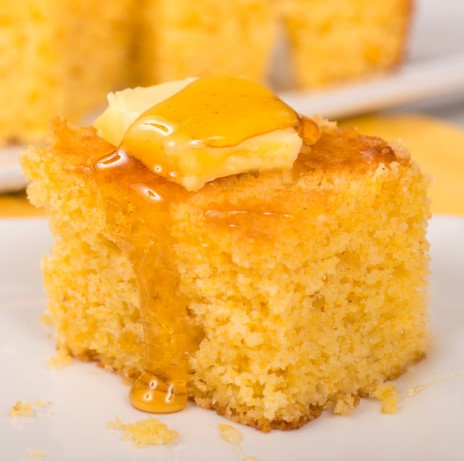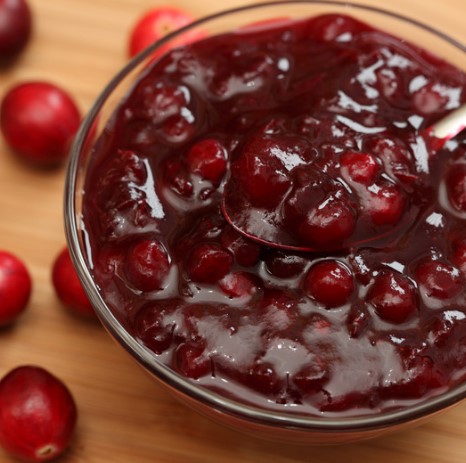
Recursos Educativos en Inglés - Stories in English
Cuentos clásicos en inglés
The Soldier's Peaches - Stuart Cloete (1897-1976)
Mrs. Brennen took snuff. She got it out of her grandson's store; going in and helping herself from the big tin on the second shelf. It was a habit her family deplored. Mrs. Brennen did not like snuff much. It was one of the things she had got over. It made her cough. But the fact that her family deplored her taking it prevented her from giving it up completely. She drank a little too. Not much; just enough to get "tiddly." That was what she called it, "I'm a little tiddly to-day," she'd say, and the family didn't like that either. Nor did she, save for the fun of shocking them and the interest outwitting them gave her.
An old woman did not have much fun, and she had her reputation as a character to keep up. Sometimes she wished she was not a character.
"Mad," people called her behind her back; "eccentric," to her face. "Dear Mrs. Brennen, you would do that. You are so eccentric." "Mad" she would not agree to; "eccentric," yes; if it was eccentric to like sitting on the stoep in the sun and only talking when you wanted to. There was too much talk in the world. Sometimes she would go for days without talking. "One of her spells," they called it. Oh, yes, she knew what they said: "Old Mrs. Brennen is having one of her spells." But she was too busy thinking to worry about what people thought. "Let 'em talk," she said. "If they'd seen what I've seen, they'd stay silent. If they'd seen what I've seen, they'd have something to think about. Lot of damned old women! That's what they are, men and all." Her family made her laugh with their goings-on. When they reached her age, if they ever did, they'd know that nothing mattered very much. She took another pinch of snuff. Some of it slipped between her fingers on to her black alpaca dress. She flicked it off with the back of her fingers and fumed to watch a span of oxen pull up to the store.
The voorloper bent down to pick up some clods to throw into the faces of the oxen. The driver whistled and turned the handle of the brake. The big wheels locked, dragged on a yard or two and stopped. Taking off his hat, the driver went into the store. The voorloper sat in the dust under the horns of the leaders.
Mrs. Brennen wondered how many wagons she had seen pull up like that since she had come to Brennen's Store as a bride. Thousands and thousands of wagons. Thousands of men, too--white men, Kaffirs, men on foot, in Cape carts, in spiders, or riding, and now they came in motor-cars. Mrs. Brennen did not like motor-cars. Of course they saved time. But what did one do with the time one saved? No one could tell her that. She chuckled. They couldn't tell her, because they didn't know.
She had seen two wars and some native troubles. Once when Brennen was away, the store had been burned by Kaffirs. She had just escaped. A friendly native had warned her. She had hidden in the bush. She had taken Susie with her--a sweet little dog. She had never had another dog like Susie-black and white, as soft to touch as silk, with a wet pink nose. Generally, black-and-white dogs had black noses, but Susie's had been pink. As she crouched among the rocks, the Kaffirs had come quite near her. Susie had tried to bark and she had held her between her knees and strangled her. Then the Kaffirs had gone and she had buried Susie. The road had been moved since then, and the new store built. Susie was buried about where the wagon stood now. She looked at her hands. They were very frail, veined, knotted and lumpy with gout. Once they had been beautiful. Brennen had said she had beautiful hands. Once they had strangled a pet dog while wild Kaffirs swarmed round her.
They were off-loading the wagon. Mealier. Her grandson, George, was buying them, then. He would pay too much for them. He always paid too much for everything. She thought of a horse he had bought once. That must have been twenty years ago. Like all horses said to be salted, it had died of horse sickness. She had told him it wasn't salted. Anyone could see it was not salted. A salted horse had a look. You couldn't explain it. You just knew the look it had.
George came out of the store now. A stupid boy. He always had been stupid.
"Don't pay ten shillings a bag!" she shouted. "Don't pay more than eight; and sample them!" If it wasn't for me, I don't believe he'd sample them, she thought. She watched him drive a knife with a hollow groove into the bags, emptying the pips into his hand. Some chickens ran out to pick up the fallen mealiest One of them picked a tick from the heel of the near wheeler--a big red and white ox that was chewing its cud.
Mrs. Brennen closed her eyes. Sometimes they forgot who she was. Yes, sometimes they forgot that it was still her store. That she was Cecelia Brennen, the mother of them all. The mother of a multitude of fools. Children, grandchildren, great-grandchildren. It was hard to keep track of them now. Each year they came to show her the new babies they had bred. She thought of her first grandson. She had been so pleased with him. She looked at George; he had been the first grandson. He was leaning against the door of the store. Babies were like everything else; when there were so many of them, they became commonplace. It was hard to remember their names or even their mothers' names. She liked the Kaffir babies best--black like puppies, and pleasantly nameless. The Kaffir women who brought them to her to admire did not expect her to remember anything; all they wanted was a smile and a present. But that was what most people wanted, when you came to think of it--a smile and a present.
She nodded her head. They thought her memory had gone; but she knew more than the whole pack of them put together. Knew everything that was worth remembering. Ninety-three, and the pattern of her life trailed out like a cloak behind her--her loves and hates, that had once been so hot and cold, all meaningless now--just part of the fabric; brilliant threads that had been woven through it. Remember--she remembered all right. The things she forgot, like the names of her great-grandchildren, and of the women her grandsons had married, were not important. What did it matter if she did not recognise them all, so long as they knew her? Besides, women all looked the same now. They had no character--short curly hair, red lips, red nails and no shape.
She watched the wagon go. The driver shouted and clapped his whip. The voorloper trotted in front of the running oxen. The hind wheels were still locked, and dragged. That was like a Kaffir, to start his span with the brake on. The driver clapped his whip again and took off the brake, then he ran forward and jumped on to the disselboom. She remembered a man being brought into the store who had been run over that way. He had slipped and the wheels had gone over his legs. Empty of ballast, the wagon moved noisily. One wheel let out piercing squeaks. Grease, Mrs. Brennen thought. George should have noticed it and sold him some grease.
She stared down the road. It was red, unmetalled, dusty, and wide enough to turn a span. Part of it was bordered with big blue gums; grey foliaged untidy trees whose bark hung in torn white ribbons from the trunks. There was the bottle store, the chemist's, the Standard Bank, the coolie store, and the usual white houses with red roofs that got smaller and more disreputable as the road went on. The best part of the dorp was behind her. That was where the doctor lived, and the bank manager, and Mr. Fairburn. No one knew quite what Mr. Fairburn did or where he got his money. That was where George wanted to live. He thought it was common to live opposite the store. He wanted to drive down to it in his new car each day, as if he was a professional man.
She laughed. Perhaps that was it, or perhaps he wanted her tucked away safely where she could not see everything that went on. But the store was her life. It did not change, like the children. It did not die. It did not go away. It grew, but it grew slowly and precisely. You knew which way it was going to grow. Seventy years was a long time to sit in one place. She had been asked why she did not travel! Travel. Why go and look for life when it was going on all around you if you had eyes to see and waited long enough? She thought of the story of the two hunters. One had walked for miles, looking for game. The other had sat near a water-hole. The first had killed nothing. The second had taken what he wanted. It was better and less exhausting to let things come to you than to go and search for them. The store was like a water-hole--everyone had to come to it in the end. If they wanted a needle or a plough, they came to Brennen's.
She saw a car. What a dust it threw up! It came from Pretoria. It was many years since she had been there. They said Church Square was now a garden. It had been the outspan. They had often outspanned there in the old days. Sometimes there had been two hundred wagons, Lying wheel to wheel. But the great days were gone, and where were the men to day who could compare with the men she had known then? Men like the old president, Joubert, De Wet, De la Rey, Cecil Rhodes, or Doctor Jim. Men like Brennen her husband. That was another reason she sat in the store all day. Brennen was with her. She could feel his company.
She looked at George. He had not moved. George was fat. She hated fat men. A fat woman was comfortable, but a fat man an abomination.
The car stopped at the store. A young man got out; he had a letter in his hand. He looked at the notice outside the store. Then he went up to George and gave him the letter. She would find out what was in it later. A man in a car bringing George a letter.
George was bringing him over. He looked like an Englishman. There was even something familiar about him. The turn of his head or the way he walked.
"She may know," she heard George say, "but she's difficult. She has spells."
That was another of George's delusions--that she was deaf. She hated being shouted at, but it was worth letting them think it for the asides she heard.
"This is Mr. Vane," George said, putting his mouth to her ear. "He has come from England, Ouma."
She put out her hand. "I can see he comes from England," she said. "Look at his boots." Mrs. Brennen wondered if she would take snuff now or later. He seemed a nice young man, fresh complexioned, very clean and shiny, with reddish hair.
"Sit down," she said.
He sat down.
"How much did you pay for those mealies, George?" she asked.
"Nine shillings."
He would go in a minute and leave her with the young man. George got up.
"I said you weren't to pay more than eight."
She looked him up and down. Once she had had great hopes of George.
"I'II be going," George said. "See you later."
"Thank you," the Englishman said. "I do hope I'm not being a nuisance, Mrs. Brennen."
"Nothing is a nuisance now," she said.
She got her snuff-box. "Take snuff?" she asked.
"No, thank you."
"Quite right, young man. A filthy habit. He"--she pointed to George's back--"thinks I am a disgrace to the family." She chuckled. "But I bred them. If it wasn't for me, there'd be no family--and the store is mine. That's what they don't like. They'd like to sell the store and go into something else--too grand for Brennen's general store. Ride round in motor-cars. That's what they want to do--just ride round and round. There's no sense in riding round and round." She looked at her visitor. He seemed a little bewildered. Never seen anyone like me before, she thought.
"Never seen anyone like me, have you?" she asked. "And you won't again, young man; I'm one of the last of them. Real people, we were. Men and women. Real," she said. She closed her eyes. "What do you want?" she asked. "Why did you come here? Who gave you a letter to George? No good having a letter to George. He's a fool. He's my grandson, and I know."
"It's a long story." Francis Vane lit a cigarette. He wondered how to begin. "It's my father," he said. "You see, his father--my grandfather--was killed near here with the Three Hundred and First, and I wondered if anyone could tell me about it. They sent me to George Brennen. I had a letter to him."
"No good sending anyone to him," Mrs. Brennen said.
"Do you remember them coming here?" Vane asked. "It was in November 1880."
"Of course I remember," Mrs. Brennen said. "John--that's George's father--was ill then. We thought he would die, and then they came. 'Kiss me Mother. . . kiss your darling daughter'--that's the tune they played as they marched in. They had a doctor with them--a Captain Bull. He saved John's life and we gave him a cage of wild birds. . . But what do you want to know? she asked.
"I want to know how it happened. You see, my grandfather commanded the Three Hundred and First. He was killed. They said it was his fault. That he was incompetent. My father is very old now and he broods about it. He wants to know where his father is buried. He wants to know what happened. He's very old," he said again.
"I'm very old," Mrs. Brennen said, "and I know; I brood too. Thinking, I call it. Your grandfather. Then that's it. That's why I thought I'd seen you before. I danced with him that night. He danced well. We gave them a dance in the old store." She nodded to the warehouse behind the present building. "We cleared everything out. Ploughs, harrows, soft goods and all. We put buck sails over them and gave the officers a dance. They had come from Lydenburg and were going to Pretoria. They didn't think there'd be a war. They said it would be a massacre if it came--Boars against trained troops like them. The Three Hundred and First," Mrs. Brennen said. "Yes, the Three Hundred and First."
Francis Vane leaned forward.
Mrs. Brennen saw it all. She saw them march in. "Kiss me, Mother . . . kiss your darling daughter." The drum-major tossed his stick, caught it, twirled it; men in red--an endless stream of sunburnt young men in red-mounted officers, rumbling transport, mules, baggage, wagons drawn by oxen, dogs that followed the battalion with lolling tongues.
For a day Brennensdorp had been gay, populated with soldiers. They had swarmed everywhere--walking about in pairs, standing in groups, or lying on their backs in the shade of the gum trees--they had been small then and their shade thin. She saw them washing in buckets, their young chests bare, their hair wet, their eyes wrinkled against the soapy water. She had propped Johnny up so that he could see the soldiers. And it had been hot. It was not hot like that now. It had been so hot that the sheets of corrugated iron on the roof cracked as they pulled at the nails. The trees had danced up and down on the veld and the road was wet with mirage water. The red jackets of the troops had made it seem hotter. Wherever you looked there were red jackets. How they worked to empty the store! Everyone had helped. They had thrown mealie meal on the floor to make it fit for dancing.
The colonel had come to thank her. "Thank you, Mrs. Brennen," he had said. "It is very kind of you to entertain us like this."
Colonel Vane had admired her. She had seen it in his eyes. "I hear your little boy is ill" he said. "Perhaps we can help you. Would you like to see Captain Bull, our doctor?"
She had seen him. A kindly man. He had come at once in his dusty boots. Brennen had given him beer. The bottles were kept cool in a canvas bucket that hung from the roof. "I'll stay with him, Mrs. Brennen," the doctor said, and he had stayed watching at the bedside.
The dance had been an event. Boys had been sent out to call in the countryside--all that were loyal, that is--and they had come, every man and woman and girl for miles round. Both sides of the street had been full of their Cape carts and buggies. The regimental band played tune after tune. The doorway was filled with watching Tommies. The dust and mealie flour had risen off the floor in clouds. It clung to the dresses of the girls, to the clothes and moustaches of the men. Music, laughter and some kissing.
There was a tale she had heard about a clown who had made jokes while his little son was dying. She felt like that clown. She kept going in to look at Johnny. The doctor put his finger to his lips and motioned her away. She had gone away. . .
"May I have the pleasure of this dance, Mrs. Brennen?"
"Delighted."
"How well you dance, Mrs. Brennen."
"How light you are, Mrs. Brennen."
What did they expect, she wondered. It was strange how one could go on saying and doing all the right things when one was feeling nothing. It was as if one stood some way off watching oneself. She had noticed this, time and again. That cannot be me. This cannot be me. Cecelia Brennen could not be doing this. But Cecelia Brennen was doing it. Her place was with her son; her place was at the dance. She was Mrs. Brennen, the wife of John Brennen, of Brennensdorp. It was her place to entertain the soldiers of the Queen.
There had been a great killing of beasts and fowls, a great baking, a great emptying of casks of wine and brandy. She had seen to it all, and to her sick child as well. She had worn cyclamen taffeta with a bustle and hoops.
Her hair hung in ringlets round her neck. A pretty young thing--the belle of the ball and the mother of a dying child. But he had not died. If only Johnny can grow up strong and healthy, like these officers, she thought. If only-- Excusing herself, she ran to see him. Captain Bull was asleep; the child slept, too, his hand in that of the soldier. How tired he looked!
In the morning Johnny was better. "He'll come through," the doctor said. He made up medicine for him in a whisky bottle. She and Brennen had wondered what they could give him. They could not give money. "Give him my cage of birds," Johnny said. They were beautiful birds; little finks of every colour--rooibekkies, blouvinks, kingvinks. They were all tame, and sang and twittered on their perches. She had taken them to Captain Bull. "A present from Johnny," she said. Brennen had come at that moment with a Kaffir carrying a case of champagne. The champagne and the birds had been stowed in the doctor's cart. The case of wine on the bed, and the cage slung from the roof and lashed to the sides, so that it should not swing.
"Good morning, Mrs. Brennen." Colonel Vane rode up. "I am glad to hear your little boy is better."
Behind the colonel there was a donkey wagon loaded with yellow peaches. It had just come in and the soldiers were crowded round it, eating peaches and stuffing them into their haversacks to eat on the march. The colonel was laughing.
"Fruit's good for them," he said.
"It's a good year for peaches. And the trees in the district are weighed down with them," she said.
Then the bugles sounded. The colour-sergeants shouted, "Fall in." The markers were waiting. The men, fully accoutre, ruddy with sleep, ran out. Transport drivers cursed as their hubs bumped. The Three Hundred and First was going. They had come and they were going.
"Kiss me, Mother. . . kiss your darling daughter"--the band struck up again. Like a red snake the regiment swung out of the dorp in a cloud of dust. Then the dust fell. To-night they would lie in Pretoria.
The Three Hundred and First had gone and Johnny would get well. She was sitting with Johnny when it happened. A man came galloping down the street. A private soldier, wounded, riding an officer's charger. It was streaked with sweat, its chest splashed with foam, its eyes were wild. She recognised the horse. It was Colonel Vane's horse. The big bay she had patted as he said good-bye.
The soldier pulled up and almost fell from the saddle.
"What is it?" she said. "Oh, what is it?" She knelt beside him in the dust.
"The doctor sent me to get help! They are all finished!" he said. "They're cut to hell--the whole bloody lot! We walked into it! The colonel's dead! I took his horse!" He began to cry. "They got us--they got us fair! It was murder!"
He was only a boy. She held him in her arms and the blood from the wound in his neck ran on to her shoulder. Suddenly he sat up. "Bandages," he said, "and brandy. . . and food! That's what the doctor said! We've got no bandages! They're all bleeding, and nothing to stop it! Oh, God, Mrs. Brennen, nothing to stop it! I must get back!" He dragged the horse towards him and tried to mount.
"What are you going to do?" she asked.
"I don't know, but I must go back. I can't stay here."
"Where is it? Where did it happen?"
"At the little river--they were all round us."
"The Spruit?"
"That's what they call it."
Brennen was inspanning already, loading up the Cape cart. That would be the quickest; the wagons could follow. It was not very far. She ran into the house for sheets, towels, bedding, mattresses, blankets, brandy; the house and store were emptied of everything that might be useful.
She climbed into the cart beside her husband. He had put in four horses instead of two.
"Trot the oxen, Jan!" he shouted to the driver who was inspanning.
"They cannot trot so far, baas!"
"Trot them and be damned!" Brennen said.
And then they were off at a gallop, rocking first on one wheel and then on the other as they hit the bumps in the road. Hardly checking for the drift, they splashed through the water. Brennen hit the horses as they slowed up to pull out of it. She had never seen him hit a horse before. They sprang into the traces again with such a jerk that she thought the swingletree would break loose. She looked at the pole. Brennen had tied it with a double riem. They were on the flat now. The horses were bolting. Let them bolt. Nothing could go wrong with a strong cart and good gear on a straight road unless one of the horses fell. The whip clapped like a pistol as Brennen urged them to greater speed. The four reins were like live things in his hands as he cried out the horses' names: "Bles! Charlie! Klinkie! Chaka!" Chaka was a new black horse. Brennen had put him on the off lead, where he could get at him best with his whip. "Come, Bles! . . . Come, Charlie!" She gripped the arms of her chair. What a drive it had been. She smelt the dust in her nostrils.
The road was always dusty, but now it had been made worse by the passing of a thousand men and their transport. The dust rose in clouds, obliterating everything, so that sometimes she could see only the horses' ears and their tossing manes. The reins went down to nothing. They disappeared into the dust. She could see no road. That they kept on it was a miracle.
And then they got there. The horses shied and pulled across the road as the leaders almost ran into an overturned wagon.
The dust fell slowly.
"You've come." It was the boy on the colonel's horse. "I was coming back to find you," he said.
They got out of the cart. Some soldiers took the horses out. She saw it all--the undulating ground, the bush, the trees by the road--many of them scored by bullets. There was blood everywhere. It ran down the sloping road into pools.
They helped the doctor to move the men, to bandage, to cut more bandages. Tents were pitched, food cooked, great cauldrons of hot water got ready to dress the wounded. She had gone in to Colonel Vane. His legs were off. While she was with him, Frantz Joubert, the Boer commandant, had come in.
"Will you drink with me, Commandant?" the colonel said. "And you, too, Mrs. Brennen." It was the champagne her husband had given the doctor. They drank. Joubert said, "Here's to Queen Victoria. May she live long and take her soldiers from the Transvaal."
They had wrapped the dead in blankets and buried them where they fell along the side of the road, on the veld where they had taken up their positions. Beside almost every body there were peaches; they had fallen from the hands of the men as they were ambushed. Their pipe-clayed haversacks still bulged with them. The dead of the Three Hundred and First were buried with their peaches where they lay.
She saw Johnny's cage of birds. It was broken and the birds were free. The wild birds were free once more and the men were dead.
"Yes," she said, looking up, "that's what happened to the Three Hundred and First. The birds were free and the men were dead, and buried where they fell."
"But--" Vane said.
She had not spoken. She had sat for nearly half an hour with her head sunk on her breast.
She looked accusingly at her grandson. "And they think I can't remember. I can remember everything. I can even remember the names."
"That's what I was afraid of," George Brennen said--"one of her spells."
They were silent, staring at the old woman; her head was lowered again.
Suddenly, from the next house, a woman screamed at a child.
"Didn't I tell you not to eat so many peaches? Peaches--you guzzle peaches all day, and then bring them home at night, so that you can eat more. You'll be sick, I say. Where did you get them? Did you steal them?"
"I didn't steal them, Mother. They're the soldiers' peaches. We drove ova there to get them. They're wild peaches." The child was crying.
Mrs. Brennen got up. "Let her have the peaches. Let her have all she wants. The soldiers' peaches never hurt anyone." Mrs. Brennen sat down again. "The soldiers' peaches," she said--"that grew out of their pockets."
Tears ran down her cheeks. They followed the lines of her face and dripped on to the snuff-stained alpaca dress. She made no effort to stay them.
"Out of their pockets?" Vane said.
"She means their haversacks."
"Then there are peach trees?"
"Yes, there are trees--plenty of them."
"And they buried them where they fell? Do you know the place well?" Vane asked.
"Everyone knows it well. All the children get peaches from them. They grow like this." George Brennen traced a pattern on the dust of the stoep with his finger. "Here is where there are the most. . . . That was where the main body got it. . . . They were buried on both sides of the road . . . and out here is where the scouts fell.'' He made scattered dots.
"Then there were scouts out," Vane said. "And it wasn't my grandfather's fault."
"It was nobody's fault," Brennen said. "The Boers were hidden and they held their fire."
Vane laughed. "Can we go over there to-morrow?" he asked. "I'll make a map of it for my father. Poor father," he said. "If only he had known this years ago! He nearly came once, and then he was afraid to come--afraid of what he'd find."
"We call them the soldiers' peaches," George Brennen said. "And I wish she had told you the story--I have heard it hundreds of times--but she's old; she has spells."
His grandmother looked up. "I remember as well as anyone," she said. She pointed to Vane. "I remember his grandfather. A fine man. There were some fine men in those days."
Brennen took Vane's shoulder. "Come along to my place. Spend the night and we'll drive over there to-morrow."





